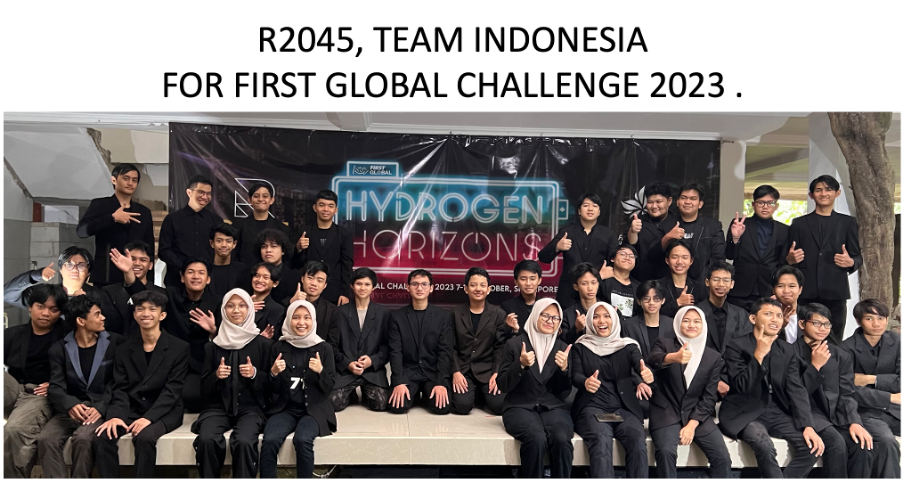
Team Indonesia knowns as Rendezvous 2045 Team , has its own unique stories to tell the world about how a group of youth of Indonesia taking an initiative and making promise to meet in 2045 in transforming Indonesia toward industry 4.0 as it approaches its golden anniversary and how they observe the challenges of the future and ensuring Indonesia rich biodiversity will still offer opportunity for the next generation by conserving the nature against waste especially plastic waste/pollutant, then how they choose STEAM education in mastering current disruptive technologies i.e Robotic, IoT , AI and soon while keeping and conserving the nature .
In order to address the impact of extensive carbon dioxide emissions on climate change, the global community is currently undertaking a transition from fossil fuels to cleaner energy sources. Hydrogen is anticipated to have a vital role in this shift as a versatile energy carrier and industrial resource, offering diverse applications. What makes it even more significant is the potential of producing clean hydrogen from low or zero-emission sources, which can facilitate extensive decarbonisation in both the energy and industrial sectors.
Hydrogen is gaining recognition as a crucial component in the transition to a low-carbon economy. Clean hydrogen produced from renewable or low-emission sources has the potential to address various challenges associated with climate change and decarbonisation efforts. Here are a few key points highlighting the role of clean hydrogen:
- Renewable Energy Storage: Clean hydrogen can be used as a means of storing excess renewable energy generated from sources like wind and solar power. When energy demand exceeds supply, hydrogen can be produced through electrolysis and stored for later use. This addresses the intermittency of renewable energy sources and allows for a more reliable and flexible energy system.
- Decarbonising Transport: Hydrogen fuel cells can power electric vehicles (FCEVs), offering a zero-emission alternative to traditional internal combustion engines. FCEVs can provide long driving ranges and fast refueling times, making them suitable for various transportation applications, including cars, trucks, buses, and trains. By replacing fossil fuel-powered vehicles with FCEVs, we can significantly reduce greenhouse gas emissions and air pollution.
- Industrial Applications: Hydrogen is widely used in industrial processes such as refining, ammonia production, and steel manufacturing. By shifting from fossil-fuel-derived hydrogen to clean hydrogen, these industries can significantly reduce their carbon footprint. Clean hydrogen can also enable the production of sustainable synthetic fuels and feedstocks, supporting the decarbonisation of sectors that are challenging to electrify directly.
- Power Generation: Clean hydrogen can be used in gas turbines or fuel cells to generate electricity with low or zero emissions. This can provide a reliable and dispatchable source of power, complementing intermittent renewable energy sources. Hydrogen can be particularly beneficial in sectors where direct electrification is challenging, such as heavy industry and some remote or off-grid applications.
- Heat and Residential Use: Hydrogen can be used as a clean fuel for heating applications in residential, commercial, and industrial buildings. It can replace natural gas in existing infrastructure, including boilers and furnaces, with minimal modifications. By utilising hydrogen for heating, we can reduce greenhouse gas emissions from the building sector.
As the world increasingly focuses on reducing greenhouse gas emissions and transitioning to a sustainable energy system, clean hydrogen holds great promise due to its versatility and potential to decarbonise various sectors. However, it's important to note that the widespread adoption of clean hydrogen will require significant investment in infrastructure, research and development, and supportive policies to scale up production and ensure its cost competitiveness with conventional energy sources.
Indonesia, being one of the largest contributors to greenhouse gas emissions globally, has made a commitment to reduce carbon emissions by 29–41% by 2030, compared to the business-as-usual scenario. In line with this goal, hydrogen emerges as a promising technology option to aid Indonesia in achieving its climate targets. With the global hydrogen market projected to reach US$201 billion by 2025, Indonesia has a significant potential to generate additional revenue by exporting renewable resources in the form of hydrogen and its related products, including ammonia and methanol.
Team Indonesia knowns as Rendezvous 2045 Team , has its own unique stories to tell the world about how a group of youth of Indonesia taking an initiative and making promise to meet in 2045 in transforming Indonesia toward industry 4.0 as it approaches its golden anniversary and how they observe the challenges of the future and ensuring Indonesia rich biodiversity will still offer ocean opportunity for the next generation by conserving the nature against waste especially plastic waste/pollutant, then how they choose STEAM education in mastering current disruptive technologies i.e Robotic, IoT , AI and soon while keeping and conserving the nature .

In correlation with Hydrogen Horizon, the Team launched initiative of Hydro Hope for Energy, to combat waste and convert it to hydrogen energy. In order to understand the process of hydrogen and status of the hydrogen production, Team Indonesia FGC2023 visited a local company Sanggar Waste To Energy (WastoE Studio) that doing a nice research on Hydrogen production on 6 of July 2023.
The purpose of visiting Sanggar Waste To Energy to understand the process of hydrogen production and the current status of hydrogen production with few possible reasons for such a visit:
- Research and Education: provide valuable insights into the process and technologies involved. Gain practical knowledge about the various stages of hydrogen production, from generation to storage and distribution.
- Industry Collaboration: foster collaboration opportunities. By understanding their processes and current status, we wish to explore potential partnerships, joint ventures, or technology sharing arrangements.
- Policy Development: gather information on policies related to hydrogen production and its integration into the energy sector. By assessing the current status of hydrogen production, we can get informed decisions regarding incentives, regulations, and infrastructure development.
- Market Research: to assess the market potential and the competitiveness of hydrogen production technologies. This can help us make strategic decisions about entering the market, identifying potential customers, or evaluating the feasibility of integrating hydrogen into existing operations.
During visit, The Team received a tour of the company's facilities, including hydrogen generation units, storage systems, and any associated technologies.

Hydrogen Generator Facilities at Sanggar Waste To Energy

Hydrogen Fire testing Facilities at Sanggar Waste To Energy
We also had the opportunity to speak with experts/ engineers involved in the production process, who can provide detailed explanations and insights into the technology, challenges, and advancements in hydrogen production.

Hydrogen Production Technology discussion at Sanggar Waste To Energy

Hydrogen Production equipment design discussion at Sanggar Waste To Energy
AI in Hydrogen Production
As most of hydrogen production is quite established. We are now proposing the technology of Artificial Intelligent into the Hydrogen Production
1. Process Optimization: AI can be used to optimize the various stages of hydrogen production, such as steam methane reforming (SMR), electrolysis, and biomass gasification. By analyding large amounts of data in real-time, AI algorithms can identify patterns and correlations that humans might miss. This enables AI to suggest process adjustments and operating conditions that improve efficiency, reduce energy consumption, and minimize waste. The identification of H2 Content from pellet can be helped by AI so we know already the quality of the Pellet.
2. Predictive Maintenance: AI can assist in the predictive maintenance of hydrogen production facilities. By continuously monitoring equipment and analysing sensor data, AI algorithms can identify patterns indicative of potential equipment failures or maintenance needs. This proactive approach helps prevent costly downtime and enables operators to schedule maintenance before critical failures occur.
3. Energy Management: Hydrogen production requires significant energy input, and AI can optimize energy management to reduce costs and environmental impact. AI algorithms can analyse energy usage patterns, weather forecasts, and market data to make real-time decisions on when to produce hydrogen, store excess energy, or use alternative energy sources. This approach helps balance energy supply and demand, optimize grid integration, and promote the use of renewable energy in hydrogen production.
4. Catalyst Design: Catalysts play a crucial role in several hydrogen production processes. AI can assist in designing and optimizing catalysts for improved performance and durability. By simulating and analysing the behavior of various catalyst materials, AI algorithms can identify promising candidates for experimentation, accelerating the discovery and development of more efficient catalysts.
5. Carbon Capture and Utilization: Hydrogen production processes, such as SMR, can generate carbon dioxide (CO2) emissions. AI can aid in developing and optimizing carbon capture and utilization technologies, which aim to capture and store or utilize the CO2 emissions. By analysing large amounts of data and simulating different scenarios, AI algorithms can help identify the most effective strategies for reducing carbon emissions associated with hydrogen production.
Overall, AI has the potential to enhance the efficiency, sustainability, and cost-effectiveness of hydrogen production processes. By leveraging the power of data analysis, machine learning, and optimization algorithms, AI can contribute to advancing the field of hydrogen production and support the transition to a clean and sustainable energy future.
- Log in to post comments
